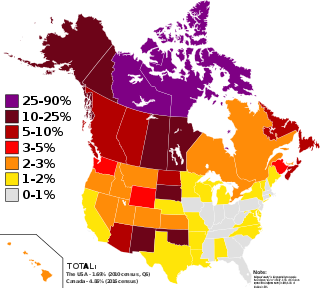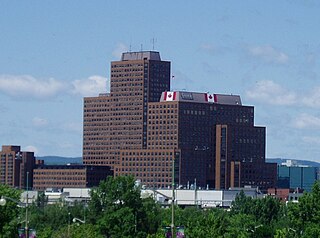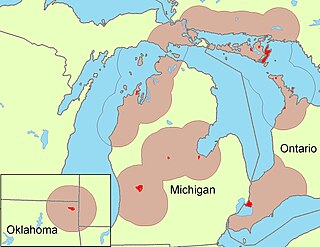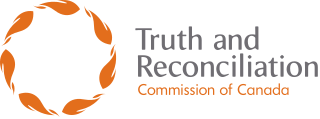Indian or Indians refers to people or things related to India, or to the indigenous people of the Americas, or Aboriginal Australians until the 19th century.

Indigenous peoples in Canada are the Indigenous peoples within the boundaries of Canada. They comprise the First Nations, Inuit and Métis. Although Indian is a term still commonly used in legal documents, the descriptors Indian and Eskimo have fallen into disuse in Canada, and most consider them to be pejorative. Aboriginal peoples as a collective noun is a specific term of art used in some legal documents, including the Constitution Act, 1982, though in most Indigenous circles Aboriginal has also fallen into disfavour.
First Nations is a term used to identify those Indigenous Canadian peoples who are neither Inuit or Métis. Traditionally, First Nations in Canada were peoples who lived south of the tree line, and mainly south of the Arctic Circle. There are 634 recognized First Nations governments or bands across Canada. Roughly half are located in the provinces of Ontario and British Columbia.
Caribbean English dialects of the English language are spoken in the Caribbean and Liberia, most countries on the Caribbean coast of Central America, and Guyana and Suriname on the coast of South America. Caribbean English is influenced by but is different from the English-based Creole varieties spoken in the region. In the Caribbean, there is a great deal of variation in how English is spoken. Scholars generally agree that although the dialects themselves vary significantly in each country, they primarily have roots in British English and West African languages. Caribbean English in countries with a plurality Indian population, such as Trinidad and Tobago and Guyana, has been influenced by Hindustani and other South Asian languages, in addition to British English and West African languages.

The Assembly of First Nations (AFN) is an assembly of Canadian First Nations represented by their chiefs. Established in 1982 and modelled on the United Nations General Assembly, it emerged from the National Indian Brotherhood, which dissolved in the late 1970s.

A multitude of languages are used in Canada. According to the 2016 census, English and French are the mother tongues of 56.0% and 21.4% of Canadians respectively. In total 86.2% of Canadians have working knowledge of English while 29.8% have a working knowledge of French. Under the Official Languages Act of 1969, both English and French have official federal status throughout Canada, in respect of all government services, including the courts, and all federal legislation is enacted bilingually. New Brunswick is the only Canadian province that has both English and French as its official languages to the same extent, with constitutional entrenchment. Quebec's official language is French, although, in that province, the Constitution requires that all legislation be enacted in both French and English, and court proceedings may be conducted in either language. Similar constitutional protections are in place in Manitoba, where English is the official language.

Crown–Indigenous Relations and Northern Affairs Canada is the department of the Government of Canada responsible for Canada's northern lands and territories, and one of two departments with responsibility for policies relating to Indigenous peoples in Canada.

The Métis are Indigenous peoples in the three Prairie Provinces, as well as parts of Ontario, British Columbia, the Northwest Territories, and the Northern United States. They have a shared history and culture and are of mixed Indigenous and European ancestry which became a distinct group through ethnogenesis by the mid-18th century, during the fur trade era.
First Nations in Alberta are a group of people who live in the Canadian province of Alberta. The First Nations are peoples recognized as Indigenous peoples or Plains Indians in Canada excluding the Inuit and the Métis. According to the 2011 Census, a population of 116,670 Albertans self-identified as First Nations. Specifically there were 96,730 First Nations people with registered Indian Status and 19,945 First Nations people without registered Indian Status. Alberta has the third largest First Nations population among the provinces and territories. From this total population, 47.3% of the population lives on an Indian reserve and the other 52.7% live in urban centres. According to the 2011 Census, the First Nations population in Edmonton totalled at 31,780, which is the second highest for any city in Canada. The First Nations population in Calgary, in reference to the 2011 Census, totalled at 17,040. There are 48 First Nations or "bands" in Alberta, belonging to nine different ethnic groups or "tribes" based on their ancestral languages.
The Native American name controversy is an ongoing discussion about the changing terminology used by the Indigenous peoples of the Americas to describe themselves, as well as how they prefer to be referred to by others. Preferred terms vary primarily by region and age. As Indigenous peoples and communities are diverse, there is no consensus on naming, aside from the fact that most people prefer to be referred to by their specific nations. Historically, until late in the 20th century, most Indigenous people in the Americas were collectively called "Indians." The distinct people in the Arctic were called "Eskimos." Both terms have declined in usage in formal speech.
The Royal Commission on Aboriginal Peoples (RCAP) was a Canadian royal commission established in 1991 with the aim of investigating the relationship between Indigenous peoples in Canada, the Government of Canada, and Canadian society as a whole. It was launched in response to status and rights issues brought to light following events such as the Oka Crisis and the failure of the Meech Lake Accord. The commission culminated in a final report of 4,000 pages, published in 1996 and set out a 20-year agenda for implementing recommended changes.
The Congress of Aboriginal Peoples (CAP), founded in 1971, is a national Canadian aboriginal organization, that represents Aboriginal peoples who live off Indian reserves, in either urban or rural areas across Canada. As of 2011, more than 70% of Aboriginal people live off-reserve.

The Ottawa, also known as the Odawa dialect of the Ojibwe language is spoken by the Ottawa people in southern Ontario in Canada, and northern Michigan in the United States. Descendants of migrant Ottawa speakers live in Kansas and Oklahoma. The first recorded meeting of Ottawa speakers and Europeans occurred in 1615 when a party of Ottawas encountered explorer Samuel de Champlain on the north shore of Georgian Bay. Ottawa is written in an alphabetic system using Latin letters, and is known to its speakers as Nishnaabemwin "speaking the native language" or Daawaamwin "speaking Ottawa".
Maria Campbell is a Métis author, playwright, broadcaster, filmmaker, and Elder. Campbell is a fluent speaker of four languages: Cree, Michif, Western Ojibwa, and English. Four of her published works have been published in eight countries and translated into four other languages. Campbell has had great influence in her community as she is very politically involved in activism and social movements. Campbell is well known for being the author of Halfbreed, a memoir describing her own experiences as a Métis woman in society and the difficulties she has faced, which are commonly faced by many other women both within and outside of her community.

The Truth and Reconciliation Commission of Canada was a truth and reconciliation commission active in Canada from 2008 to 2015, organized by the parties of the Indian Residential Schools Settlement Agreement.
The following is an alphabetical list of topics related to Indigenous peoples in Canada, comprising the First Nations, Inuit and Métis peoples.
The Sixties Scoop was a period in which a series of policies were enacted in Canada that enabled child welfare authorities to take, or "scoop up," Indigenous children from their families and communities for placement in foster homes, from which they would be adopted by white families. Despite its name referencing the 1960s, the Sixties Scoop began in the mid-to-late 1950s and persisted into the 1980s.
Indigenous or Aboriginal self-government refers to proposals to give governments representing the Indigenous peoples in Canada greater powers of government. These proposals range from giving Aboriginal governments powers similar to that of local governments in Canada to demands that Indigenous governments be recognized as sovereign, and capable of "nation-to-nation" negotiations as legal equals to the Crown, as well as many other variations.
Deanna Helen Reder is a Cree-Métis associate professor of English and the Chair of Indigenous Studies at Simon Fraser University. Reder was elected a member of the College of New Scholars of the Royal Society of Canada in 2018. As a faculty member at Simon Fraser University, she was a founding member of the Indigenous Literary Studies Association (ILSA) and served on the council from 2015-2018. In 2019 she helped establish the Indigenous Editors Association (IEA) and served as its "Past-President" from 2020-2021.







